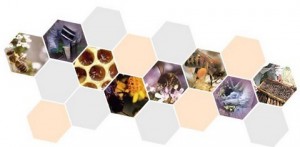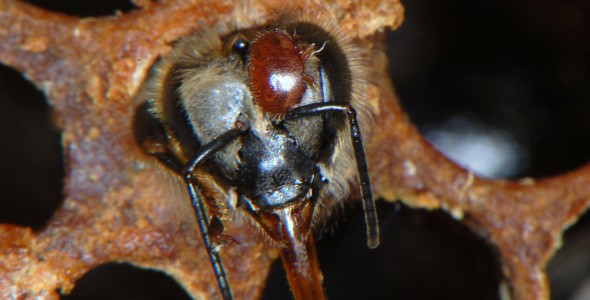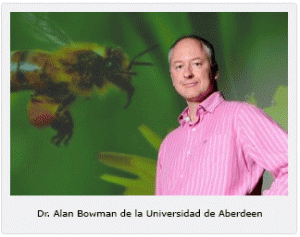-
Ulster beekeeping conference
A few days after St Patrick’s Day, Vita attended the very successful Ulster Beekeepers Association Annual Conference in the town of Antrim where 350 bee folk had gathered to hear talks and visit trade stands.
-
The view from Apimondia 2013
I’ve put a Facebook photo album up of some of the sights that have caught our eyes at Apimondia this year. The link below should be accessible even if you don’t have a Facebook account.
Below are a few tasters.
Enjoy!
Sebastian Owen, Commercial Development Manager
Follow me on Twitter: @SDWOwen -
Fun and Friends, Queues and Chaos at Apimondia 2013
Since Beijing 1993, even before Vita was founded, the biennial beat of Apimondia has provided the rhythm to our business lives. From Melbourne to Montpellier and Durban to Dublin, Vita has long been a huge supporter of Apimondia, and frequent Gold Sponsor.
Kyiv 2013, is no different and we began building up to this event almost on the flight home from Buenos Aires two years ago. We’re a Gold Sponsor again this year and there are about 15 of us manning the stand, from all over the world.
I should say, there are now 15 of us manning the stand. On day one, only three of us were able to get through the doors to set everything up. I was one of the lucky few – arriving early enough and with a staff pass that allowed me to get in blissfully unaware of the mayhem going on outside.
Sadly, most were not so fortunate. Stories abound and the one thing we can say about Apimondia this year is that it’s given everyone something to talk about. Sadly, delegates aren’t swapping beekeeping tips and stories, they’re comparing notes on time spent queuing and fights witnessed. I think the worst I’ve heard is seven hours in the queue, unprotected from the bitter rainstorms.
It’s rare to hear of anyone who managed to register after less than three and a half hours in a queue that has been described to me as a rugby scrum or the bottom of an American football pileup. Veterans are amazed that the flimsy registration desks held up to the shoving and I’m surprised that I’ve not seen more black eyes wandering around the congress!
Over the past seven or eight months, we’ve been in very close contact with the local Organising Committee and they’ve really done everything possible to help make this a successful, innovative and memorable congress. While a lot of avoidable mistakes were made, the Committee will also point to some technical problems that could not have been foreseen.
Unfortunately, Apimondia 2013 in Kyiv will be a memorable one, but for a lot of the wrong reasons.
To end on a positive note, part of the problems with registration were due to an unprecedented demand for entrance to Apimondia which must be a good sign for the health of the beekeeping sector. The volunteers here have worked themselves to near collapse in extremely difficult circumstances, and the organisers always try to find time to help in any way they can. As always we’ve caught up with old friends and made new ones and we’re already planning for and looking forward to Daejeog, Korea in 2015. Onwards and upwards!
Sebastian Owen, Commercial Development Manager
Follow me on Twitter: @SDWOwen -
Does your national government help your honeybees?
 The frenzy is well underway in European Union countries as governments finalise their plans for the upcoming funding cycle for honeybees and beekeeping.
The frenzy is well underway in European Union countries as governments finalise their plans for the upcoming funding cycle for honeybees and beekeeping.In September, the EU is expected to approve each Member State’s national programme for support of the beekeeping sector. The coming three-year cycle runs from 2014 until 2016 and is intended to cover areas including Varroa control, applied research, technical assistance, laboratory support, migratory beekeeping and the restocking of hives.
I think it’s worth looking at the different approaches taken around the continent.
Provided they fit the broad areas (listed above) outlined in Article 106 of the relevant EU Directive (here, if you’re interested), governments are free to allocate the funding as they choose. In practice, approaches tend to fall into three groups, outlined below.
1 – ‘We do quite enough already, thank you very much’
Here in the UK, beekeepers don’t get a whiff of EU funding. Anecdotal evidence suggests that it is simply allocated straight to FERA, who provide support for the beekeeping sector in the form of the excellent National Bee Unit and our network of regional bee inspectors. Other countries adopting a similar approach include Ireland, Sweden, Holland and Denmark, all of whom plough the EU subsidy directly into research programmes. While research into bee health is clearly vital, what irks some beekeepers is that it can appear that work is simply being carried out for its own sake. Perhaps commercial organisations (with Governmental support) are better placed to carry out at least some of this research, given the clear imperative for a return on their investment.2 – ‘What hurts most? Let’s try to help’
Many Central and Southern European Member States like Germany, Hungary, Lithuania and Slovenia, as well as Portugal and Italy, new Member Croatia and Accession candidate Montenegro use their EU funding to subsidise Varroa control. This has the dual benefit of aiding the fight against ‘enemy number one’ while incentivising a national register of beekeepers. This register could be considered a vital tool to track the spread of disease or pesticide resistance and cut down on rogue practices. As @SheffieldHoney pointed out on Twitter recently, in the UK one requires a licence to catch a single fish but not even a cursory check to keep millions of bees! Implementation of this strategy varies from subsidising the cost of Varroa treatments on an ‘approved list’ to handing out product free of charge but the key continuum is that support is given to registered colonies only.3 – The combined approach
France is unusual in allocating funding to almost all of the areas covered by the EU directive, at least to some degree. France uses their budget to subsidise Varroa control, as well as for the rationalisation of seasonal migration, supporting research labs, restocking colonies and providing technical assistance.Colony losses
Interestingly, a crude look at colony loss data (the figures I used relate to 2009-2012) would imply that the second approach leads to lower overall losses.Looking forwards
It will be intriguing to see what happens when the national programmes are publicised next month. We already know, for example, that Slovenia is moving away from a system whereby every registered colony in the country received free treatment but the beekeeper had no choice of product – only one product was offered and the overwhelming criterion for the choice of product was lowest price, rather than effectiveness or ease of use.We hope governments will see this round of funding as an opportunity to get support to where it really counts.
Sebastian Owen, Commercial Development Manager
Follow me on Twitter: @SDWOwen -
Secretos de la mordedura de abejas revelan
Un arma de defensa anteriormente desconocida de la abeja contra la varroasis y un anestésico natural potencialmente nuevo para los seres humanos
-
Vita ayuda a financiar nueva investigación para detener a un enemigo de la abeja melífera
Una gran inversión por parte de organizaciones del sector público y privado está ayudando a los científicos para desarrollar formas totalmente nuevas de hacer frente a la principal causa de muerte de las abejas melíferas en todo el mundo: el ácaro Varroa chupador de sangre.

Los investigadores de la Universidad de Aberdeen y la Unidad Apícola Nacional (National Bee Unit), parte de la Agencia de Investigación de Alimentos y del Medio Ambiente (Food and Environment Research Agency – FERA), han desarrollado la manera de «botar o knockdown» los genes del parásito acárido lo que hace que muera.
Hasta el momento, el trabajo solo se ha hecho experimentalmente pero ahora el equipo puede tomar su trabajo un paso más hacia el desarrollo de un producto que podría servir de ayuda a los apicultores gracias a la financiación por un cuarto de millón de libras esterlinas del Consejo de Investigación de Biotecnología y Ciencias Biológicas (Biotechnological and Biological Sciences Research Council – BBSRC) y de Vita (Europe) Ltd.
El Dr. Alan Bowman, que está al frente de la investigación, dijo: “Las abejas melíferas son de lo más importante debido a la polinización de las flores de plantas tanto silvestres como cultivadas.”
 «Sin embargo, sus números están en serio declive año tras año y, aunque probablemente esto se deba a varios motivos, uno de los factores más importantes es el ácaro Varroa destructor que chupa la sangre de las abejas y transmite graves enfermedades virales.”
«Sin embargo, sus números están en serio declive año tras año y, aunque probablemente esto se deba a varios motivos, uno de los factores más importantes es el ácaro Varroa destructor que chupa la sangre de las abejas y transmite graves enfermedades virales.”“Prevalece una necesidad urgente de desarrollar un tratamiento antivarroa que sea ecológico y específico, o algún método de contrarrestar el mecanismo de resistencia del ácaro a los tratamientos existentes y es eso en lo que estamos trabajando ahora.”
El Dr. Max Watkins, Director Técnico de Vita (Europe) Ltd, uno de los principales financiadores de la investigación, dijo: “La búsqueda de tratamientos que matan a los ácaros Varroa, pero no perjudican a las abejas, los productos apícolas o el medio ambiente, no es fácil. El desafío se ve acentuado debido a que el ciclo de vida relativamente corto de la varroa acárida significa que la resistencia a un solo tratamiento puede con frecuencia desarrollarse relativamente rápido, a menos que los apicultores alternen usando tratamientos de distintos tipos. Por lo tanto, Vita está respaldando esta fascinante e innovadora investigación y espera que finalmente se desarrolle un tratamiento efectivo y ecológicamente sensible, a un coste que sea asequible a los apicultores de todo el mundo.”
El Dr. Giles Budge, de la Unidad Apícola Nacional de FERA, añadió “Estamos encantados de estar en posición de posibilitar el progreso de esta investigación, desempeñando nuestro cometido de facilitar la traducción de la ciencia, por parte de los eminentes académicos de Aberdeen, a una compañía como Vita que tiene un historial establecido de investigación, desarrollo y marketing de nuevos productos de salud apícola. Es especialmente gratificante ver nuestro trabajo convertirse, de experimentos en el laboratorio, a productos que podrían llegar a ser comercialmente disponibles para ayudar a los apicultores.”
Los investigadores crearán y buscarán minuciosamente las bases de datos de todos los genes de Varroa en un intento por identificar a los que puedan ser efectiva y seguramente apuntados por nuevos tratamientos potenciales.
El Dr. Bowman añadió: “Debido a que dependemos de las abejas melíferas para polinizar nuestros cultivos y añadir variedad a nuestras dietas, existe una verdadera necesidad de abordar el problema de su decadencia. Tras haber probado nuestro concepto en el laboratorio estamos encantados de que esta financiación nos permitirá seguir desarrollando nuestra investigación para que tenga un impacto en el mundo real.”
Notas para los Editores
Más acerca de la investigación
Dirigido por el Dr. Alan Bowman, el equipo de investigación va a utilizar técnicas moleculares modernas para investigar el silenciamiento de genes y la identificación de genes diana adecuados en el ácaro varroa.
En 2010, en una publicación académica arbitrada, el Dr. Bowman produjo la primera comunicación sobre el «knockdown» satisfactorio de genes en una especie acárida, específicamente la causante de varroasis, mediante interferencia por ARN (RNAi), una técnica de silenciamiento de genes. Ya anteriormente se había demostrado que esta técnica tenía éxito con invertebrados inyectando moléculas cortas de ARN bicatenario (dsRNA) interferente. Bowman mostró que el pequeño tamaño de varroa no tenía porque plantear problemas infranqueables y descubrió que la inmersión en una solución de dsRNA podría producir resultados de una manera relativamente fácil, rápida y económica.
Una vez probado el éxito de la técnica en el laboratorio, el reto de la investigación actual es encontrar los genes que sean los más relevantes y susceptibles de ser apuntados y, a largo plazo, desarrollar un tratamiento adecuado y asequible para su utilización por los apicultores.
La primera etapa del nuevo trabajo es usar la “Secuenciación de la Siguiente Generación” para identificar y describir todos los genes de la especie Varroa destructor. A partir de cientos de millones de piezas de información de secuenciación de genes, el equipo buscará el talón de Aquiles de la varroa acárida, y verificará que el apuntamiento no solo no afectará a las abejas sino tampoco a ninguna otra especie animal.
Una vez identificados los genes vulnerables de la varroa acárida, la búsqueda se centrará entonces en producir un tratamiento para apuntar a esos genes. Seguidamente, los ensayos de laboratorio y sobre el terreno probarán a fondo la eficacia y la seguridad de los tratamientos potenciales.
Se propondrá a los apicultores de todo el Reino Unido que se registren para enviar ácaros varroa al Dr. Bowman para su investigación. Deberán comunicarse por correo electrónico con su nombre y dirección. Se suministrará el embalaje y se cubrirán los gastos de envío.
Acerca de Vita (Europe) Ltd
Vita (Europe) Limited es un especialista en el control de ácaros y el cuidado sanitario de las abejas. Es el mayor proveedor mundial de productos de salud para la abeja melífera dedicado a las industrias de la miel y de la polinización. Con sede en el Reino Unido, con oficinas en Italia, Francia y Rusia, y socios en todo el mundo, Vita investiga, desarrolla y fabrica una gama de productos para la salud de las abejas. Estos productos se comercializan a nivel internacional a través de una red de 60 distribuidores en 50 países.
Acerca del BBSRC
El Consejo de Investigación de Biotecnología y Ciencias Biológicas (Biotechnological and Biological Sciences Research Council – BBSRC) invierte en investigación y formación de clase mundial en biociencias, en nombre del público del Reino Unido. Nuestro objetivo es avanzar el conocimiento científico para promover el crecimiento económico, la riqueza y la creación de empleo para mejorar la calidad de vida en el Reino Unido y más allá. Financiado por el gobierno, y con un presupuesto anual de alrededor de £445 M, respaldamos la investigación y la formación en las universidades e institutos financiados de manera estratégica. La investigación de BBSRC y la de las entidades que financiamos están ayudando a la sociedad a solventar sus mayores retos, incluida la seguridad alimentaria, la energía obtenida por medios ecológicos, así como el logro de vidas más saludables y más largas. Nuestras inversiones sustentan a importantes sectores económicos en el Reino Unido, como la agricultura, la elaboración de alimentos, la biotecnología industrial y los productos farmacéuticos. Para obtener más información acerca del BBSRC, nuestra ciencia y nuestro impacto, diríjase a: www.bbsrc.ac.uk. Si desea más información sobre los institutos con financiación estratégica por parte del BBSRC, diríjase a: www.bbsrc.ac.uk/institutes.
Consultas de los medios de comunicación
Stephen Fleming en Palam Communications
Tel. +44 (0) 1635 299116

